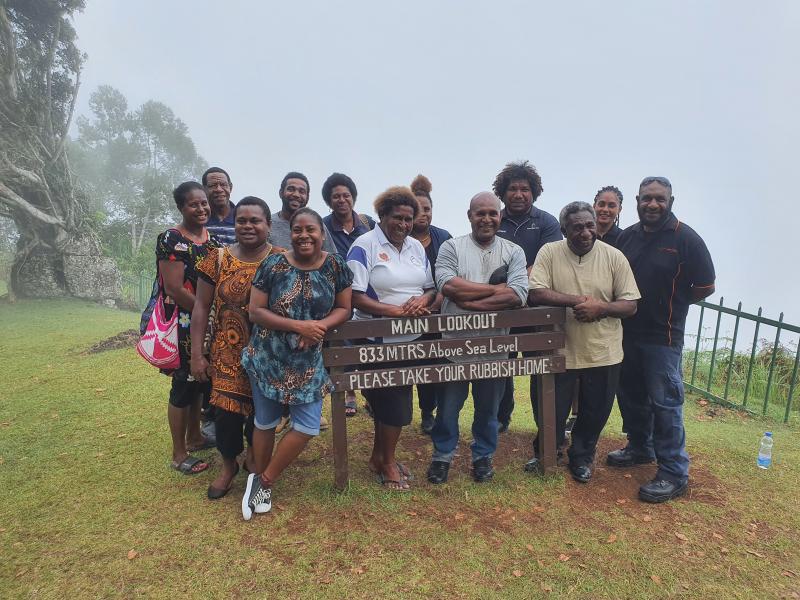
Provincial government, community leaders, industry and conservation groups recently met to share their views on an update to the country’s National Plan of Action for Conservation and Management of Sharks. The series of meetings successfully secured feedback on the draft plans and the Conservation and Environmental Protection Authority (CEPA) committed to reflecting stakeholder comments in the final documents, which will be endorsed in early 2021.
The consultations were supported by the By-catch and Integrated Ecosystem Management (BIEM) Initiative implemented by the Secretariat of the Pacific Regional Environment Programme (SPREP) under the Pacific-European Union Marine Partnership (PEUMP) programme funded by the European Union and the Government of Sweden. The meetings were organised by CEPA, the World Wide Fund for Nature Pacific (WWF) and SPREP. Meetings were held in Kavieng (NGI Region), Madang (Momase Region) and Port Moresby (Southern Region) in October and November.
The National Plan of Action for Conservation and Management of Sharks (NPOA) has been updated in response to a new Conservation Management Measure that was introduced by the Western and Central Pacific Fisheries Commission (WCPFC) in 2019. The NPOA aims to develop a consistent nationwide approach to shark and ray management and build sustainable marine resource management systems.
In Papua New Guinea a large range of shark and ray species are found in habitats ranging from deep oceans, like the Bismarck Sea, to upstream freshwater rivers. Many shark populations have seen recent declines, including the silky shark (Carcharhinus falciformis), which is now listed as a no-take species by the WCPFC. Shark populations are under pressure as shark fin and other parts of the body are exported internationally and are an important source of local and national income. They are also caught unintentionally as by-catch in tuna, prawn and coastal fisheries. The declines need to be addressed as they play an important role in the marine ecosystem as apex predators and some, such as the sawfish, are culturally significant to coastal communities.
Mr Vagi Rei, Manager for Marine Ecosystems at CEPA stressed the importance of taking a collaborative approach to conserving the shark and ray species in the country.
“This is the first of its kind for our country, and all other management plans for threatened species will also follow this precedent,” he said.
“We are happy that CEPA has travelled out to the provinces to collect views and share the existing data on sharks and rays in the country, which is something that provincial fisheries officers are lacking,” said Ms Agnes Kruter from Madang Provincial Government Coastal Fisheries team.
WWF Pacific PNG Programme is pleased to be supporting CEPA.
“In the spirit of the Government’s policy on public-private partnership, WWF took this opportunity to assist CEPA achieve this important outstanding task. It was challenging given the restrictions of COVID-19 but we are almost there, and WWF is committed to continuing to provide support until endorsement of this important work is achieved,” said Rebecca Samuel, Coastal Marine Project Coordinator from WWF.
Jamie Davies, BIEM Initiative Manager at SPREP added his support for the initiative.
“Many Pacific shark and ray species are listed as critically endangered, endangered or vulnerable. Therefore, SPREP is really pleased to be supporting CEPA finalise this new plan as part of its efforts to sustainably manage these important marine animals, which have a key role in healthy marine ecosystems as well as for food security and income for coastal communities.”
Funded by the European Union (EU) and the Government of Sweden, the EUR 45 million PEUMP programme promotes sustainable management and sound ocean governance for food security and economic growth, while addressing climate change resilience and conservation of marine biodiversity. It follows a comprehensive approach, integrating issues related to oceanic fisheries, coastal fisheries, community development, marine conservation and capacity building under one single regional action.
SPREP is leading Key Result Area 5 of the PEUMP programme, the BIEM Initiative, to support the governments of Fiji, Papua New Guinea, Solomon Islands, Tonga and Vanuatu in the sustainable management of coastal and marine biodiversity.
The BIEM Initiative consists of eight integrated areas consisting of marine spatial planning; integrated ‘ridge to reef’ ecosystem strategies and coastal zone management planning; development and integration of climate change adaptation strategies into coastal community plans; assessment of bycatch of endangered species and extinction risk; development and implementation of bycatch mitigation strategies; capacity development through research grants to citizens of Pacific island countries; support for community monitoring and protection of endangered species; and capacity development of Non-Detrimental Findings process for CITES partners. Human rights and gender equality will be core considerations in the development and implementation of each of these components. (ENDS)
For more information please contact Jamie Davies, BIEM Initiative Manager, at SPREP: [email protected].